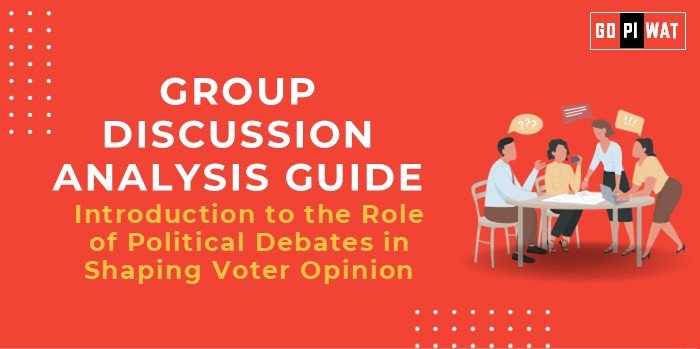📋 Group Discussion (GD) Analysis Guide: The Role of Political Debates in Shaping Voter Opinion
🌐 Introduction to the Role of Political Debates
- 📖 Opening Context: Political debates are a cornerstone of democratic societies, offering a platform for candidates to articulate their visions and engage in direct dialogue. In today’s era of media dominance, their influence on voter opinion has amplified, particularly during election cycles in countries like the U.S., India, and the U.K.
- 💡 Topic Background: Modern televised debates began with the Nixon-Kennedy face-off in 1960, which highlighted the power of visual media in influencing public perception. Today, debates are carefully curated events, with their reach amplified through social media platforms. Recent debates, such as those during the 2020 U.S. Presidential Elections, demonstrate their pivotal role in shaping voter behavior.
📊 Quick Facts and Key Statistics
- 📺 Viewership Impact: 73 million viewers tuned into the first U.S. 2020 Presidential Debate – highlighting mass influence.
- 🤔 Swing Voter Influence: 10% of swing voters decide based on debate performances (Pew Research, 2022).
- 💬 Social Media Conversations: Over 100 million tweets are generated during major political debates, showcasing their digital resonance.
- 📊 Perception Shifts: 55% of voters re-evaluate their choices after watching debates (Gallup, 2023).
👥 Stakeholders and Their Roles
- 🏛️ Candidates: Articulate policy, build credibility, and appeal to undecided voters.
- 📡 Media Channels: Facilitate discussions and set the agenda by selecting topics and questions.
- 🙋 Public: Assess candidate competence, leading to informed voting.
- 🔍 Fact-Checkers: Ensure accountability by verifying statements in real-time.
🏆 Achievements and Challenges
✨ Achievements:
- 📖 Informed Electorate: Provides voters with direct insight into candidates’ policies and demeanor.
- 🌐 Public Engagement: Sparks widespread discourse across social platforms and media outlets.
- 📌 Highlighting Key Issues: Forces candidates to address pressing public concerns like healthcare, inflation, and defense policies.
- 🌍 Global Benchmarks: Countries like France and South Korea successfully use debates for voter education.
⚠️ Challenges:
- 🎙️ Soundbite Culture: Focus on viral moments over substantive discussion.
- ❌ Misinformation: Real-time spread of unchecked claims.
- ⚖️ Partisan Bias: Media framing can polarize instead of inform.
Global Comparisons:
- 🇫🇷 France: Structured debates focus on specific policy areas, promoting depth.
- 🇧🇷 Brazil: Engages diverse audiences by including regional media hosts.
📚 Case Study: The 2020 U.S. Presidential debates highlighted key policy divides on healthcare and climate change but were critiqued for a lack of decorum.
📄 Structured Arguments for Discussion
- 👍 Supporting Stance: “Political debates empower voters by providing unfiltered access to candidates’ positions.”
- 👎 Opposing Stance: “Debates have devolved into theatrical performances, overshadowing substantive policy discussion.”
- ⚖️ Balanced Perspective: “While debates are crucial for voter engagement, their effectiveness depends on moderator impartiality and audience media literacy.”
💬 Effective Discussion Approaches
- 🎯 Opening Approaches:
- 📊 Start with a striking statistic: “Over 73 million people watched the 2020 U.S. Presidential Debate.”
- 💬 Open with a question: “Are political debates shaping opinions or reinforcing biases?”
- 🤝 Counter-Argument Handling:
- ✅ Reference international standards, such as France’s focused approach.
- 💡 Highlight reforms like real-time fact-checking.
🔎 Strategic Analysis of Strengths and Weaknesses
- 💪 Strengths: Direct voter-candidate engagement, catalyst for voter turnout.
- ❌ Weaknesses: Risk of misinformation, potential for polarizing rhetoric.
- 🌟 Opportunities: Enhanced formats using AI for real-time fact-checking, broader reach through digital platforms.
- ⚠️ Threats: Deepfake videos manipulating debate content, declining trust in traditional media.
🎓 Connecting with B-School Applications
- 🌍 Real-World Applications: Topics like media bias, decision-making psychology, and public speaking analysis align with B-school themes like marketing, leadership, and ethics.
- 📝 Sample Interview Questions:
- 💡 “How do political debates influence decision-making processes in teams?”
- 🔍 “Can media-driven narratives in debates be paralleled with consumer behavior in markets?”
- ✨ Insights for B-School Students:
- 🎙️ Study debates to enhance communication skills.
- 🧠 Analyze voter psychology for insights into consumer behavior.


